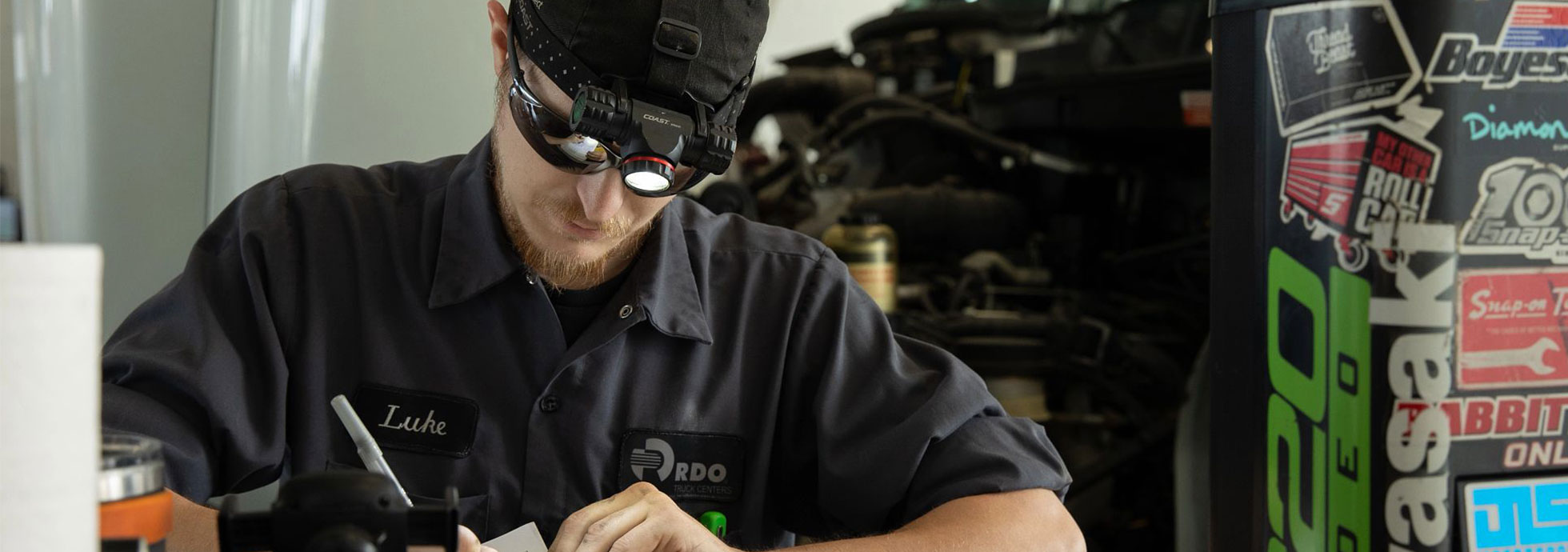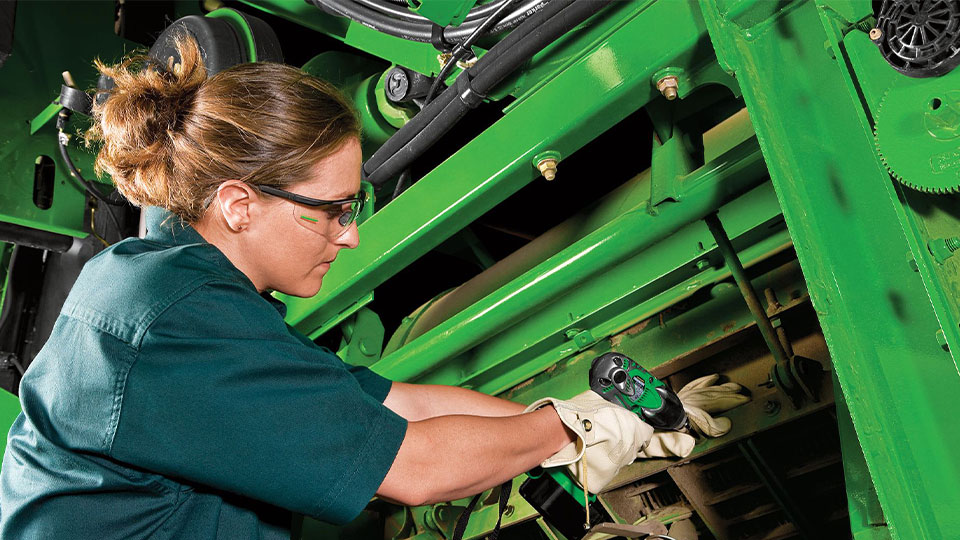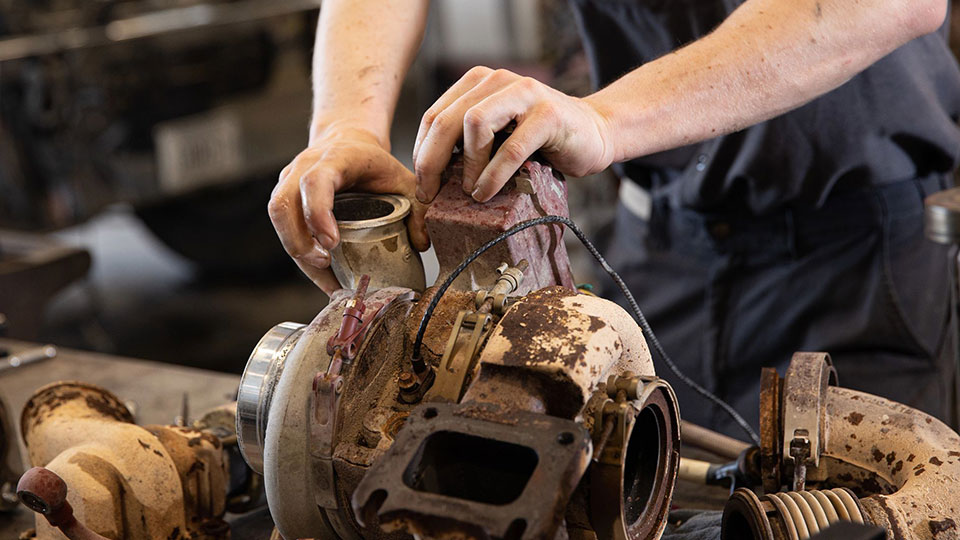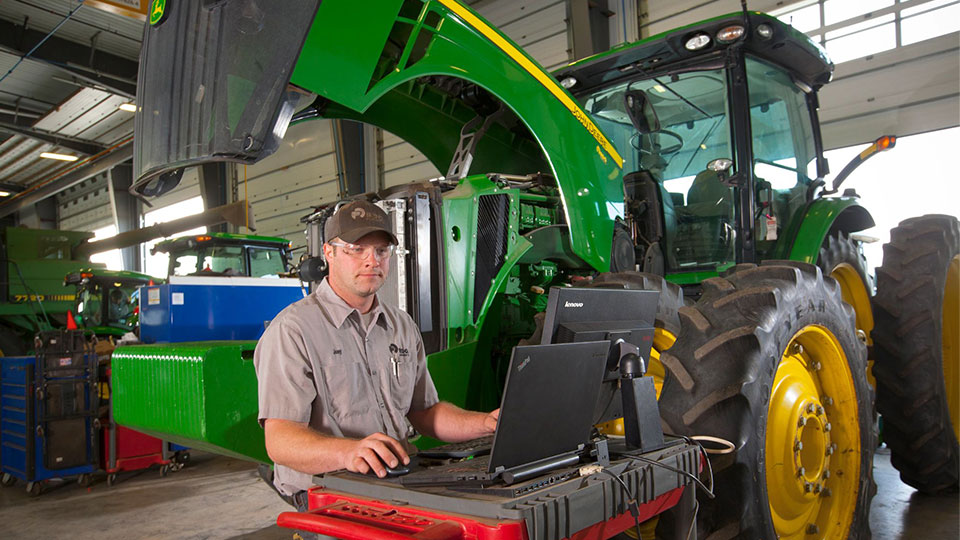
The Bureau of Labor Statistics estimates continued job stability within the diesel service technician and mechanic field between 2022 and 2032. This makes 2025 an excellent time to consider this career path.
With plenty of jobs out there, it’s natural to wonder whether you can find a place as a mechanic. If you’re considering making the jump to become a diesel mechanic, there’s certainly room for you to do so. That said, depending on your level of mechanical ability and understanding, this transition could be tricky.
Still, if you’re committed to becoming a diesel technician, there are ways to do it — even if you’ve never repaired any kind of equipment.
Here at RDO Equipment Co., we regularly add technicians to our stores (more than 80 locations and counting). These professionals keep our business moving and our customers happy — making them vital to our organization.
In this article, we’ve outlined some paths you can take to get started as a diesel technician — whether at RDO or somewhere else.
Diesel mechanics commonly have at least a high school degree or an equivalent diploma, like a GED. While post-secondary education isn’t always required, associate and bachelor's degrees in fields like diesel technology are becoming increasingly common.
That said, a high school diploma and relevant experience/training are always required to become a mechanic.

The amount of time it takes to become a diesel mechanic varies based on your background and the route you take to this profession. Getting formal education in this field can take six months to four years, depending on what kind of school you attend. Alternatively, gaining real-world experience and mechanical expertise without attending school is another option with a less specific timeframe. Expect it to take 1-4+ years to become a full-time, professional diesel mechanic.
There isn’t one defined path to becoming a diesel technician in the U.S.
Individuals with various backgrounds can take advantage of these opportunities. Provided you have a great work ethic and a willingness to learn, here are some ways to become a mechanic in 2024:
Note: You may need to do a combination of these things to get your foot in the door as a diesel mechanic.
One of the best ways to become a diesel mechanic is to go back to school. There are a ton of colleges — vocational, community and technical — in the U.S. that offer diesel technician degrees and certification programs.
If this is the route you choose, you can either earn an associate degree in diesel technology or a diesel technology certificate from a technical college.
This credential typically takes 6-12 months to complete and focuses on getting students hands-on experience repairing diesel engines, parts and components. You’ll likely be able to obtain one of these certificates from a community college in your area.
Alternatively, private tech schools like WyoTech or Universal Technical Institute (UTI) are an option.
Through a mixture of classroom and hands-on learning, with a technical certification, you’ll learn to repair, test and diagnose:
You’ll also learn more about the tools of the trade. This will set you up for an entry-level opportunity (like an internship) as a heavy equipment technician.
To become a diesel technician, you can also pursue an Associate of Applied Science (AAS) or Associate of Science (AS) degree in Diesel Technology. This typically takes 60-80 credit hours and lasts around two years.
Earning an associate degree is a great way to set yourself up for long-term success as a diesel technician — especially if you’re hoping to get a job outside the shop environment eventually (some office jobs may require this level of education).
Here are some things you will learn to diagnose and repair when pursuing an AS/AAS in diesel technology
The downside is that getting an AAS degree can take longer than obtaining a certificate. However, it may be worth the time investment if you’re aiming for a career in the maintenance industry and want more diverse job opportunities.
Note: Some U.S. colleges have recently started offering bachelor’s degrees in diesel technology.

Sign Up: Service Technician Monthly Newsletter
Become a more profitable, successful mechanic with insights and resources sent to your inbox every month.
While pursuing an education in diesel technology is a great way to start in this field, it’s not the only route. Another option is to gain experience using maintenance tools and diagnosing, examining, and fixing machinery/equipment.
The goal would be to develop an applicable skill set that would translate well into this work.
Even if this isn’t in a professional shop setting (like fixing equipment on the family farm or getting familiar with engine components by working on cars in your garage), developing skills will set you up for a career as a mechanic.
Sure, you’ll still need formal training and mentorship, but many companies hire mechanics with these experiences.
It’s not uncommon for diesel mechanics to enter the field after spending time in a similar one. The most common example is when an automotive mechanic switches industries, but any kind of mechanic career applies.
Transitioning into a diesel role is usually smooth for a professional mechanic.
Many major employers offer new technicians an on-ramp into the trade through internship experiences. While it varies by employer, diesel technology internships give participants paid on-the-job training, exposure to the diesel maintenance world and the opportunity to learn from highly-skilled mechanics in a real-world setting.
It’s most common for an internship to be offered to mechanics currently in school to supplement their education. However, it may still be worth applying if you have a background in equipment maintenance without formal education.
Internships can often become a springboard into the diesel technology industry, rolling over into full-time job opportunities upon completion.
If you’re interested, RDO offers an Access Your Future Service Internship in multiple U.S. locations.

Becoming a diesel technician can be a great career move. Professional mechanics make an excellent living, have a lot of opportunities (the demand for their services is very solid) and make measurable impacts on their companies and the customers they serve.
Your journey into the diesel trade will differ depending on your background and career aspirations. If you’re new to the maintenance field, try to develop a skill set, attend a school and lock down an apprenticeship opportunity.
Alternatively, if you’re already a professional mechanic or thoroughly understand equipment maintenance, you can start by finding an employer willing to train you.
Either way, your immediate next step is to uncover the common challenges diesel mechanics encounter in their jobs. If you can overcome them, nothing will hold you back in your mechanic career.
RDO Equipment Co. proudly employs nearly 1,000 service technicians across the U.S. This includes interns and apprentices all the way up to senior technicians. These employees are the backbone of our organization. As such, we invest heavily in their training and development, allowing them to take control of their career trajectory through career pathing.
If you’re looking to take the next step in your career as a technician at a company that will put you first, find an open position in your area.